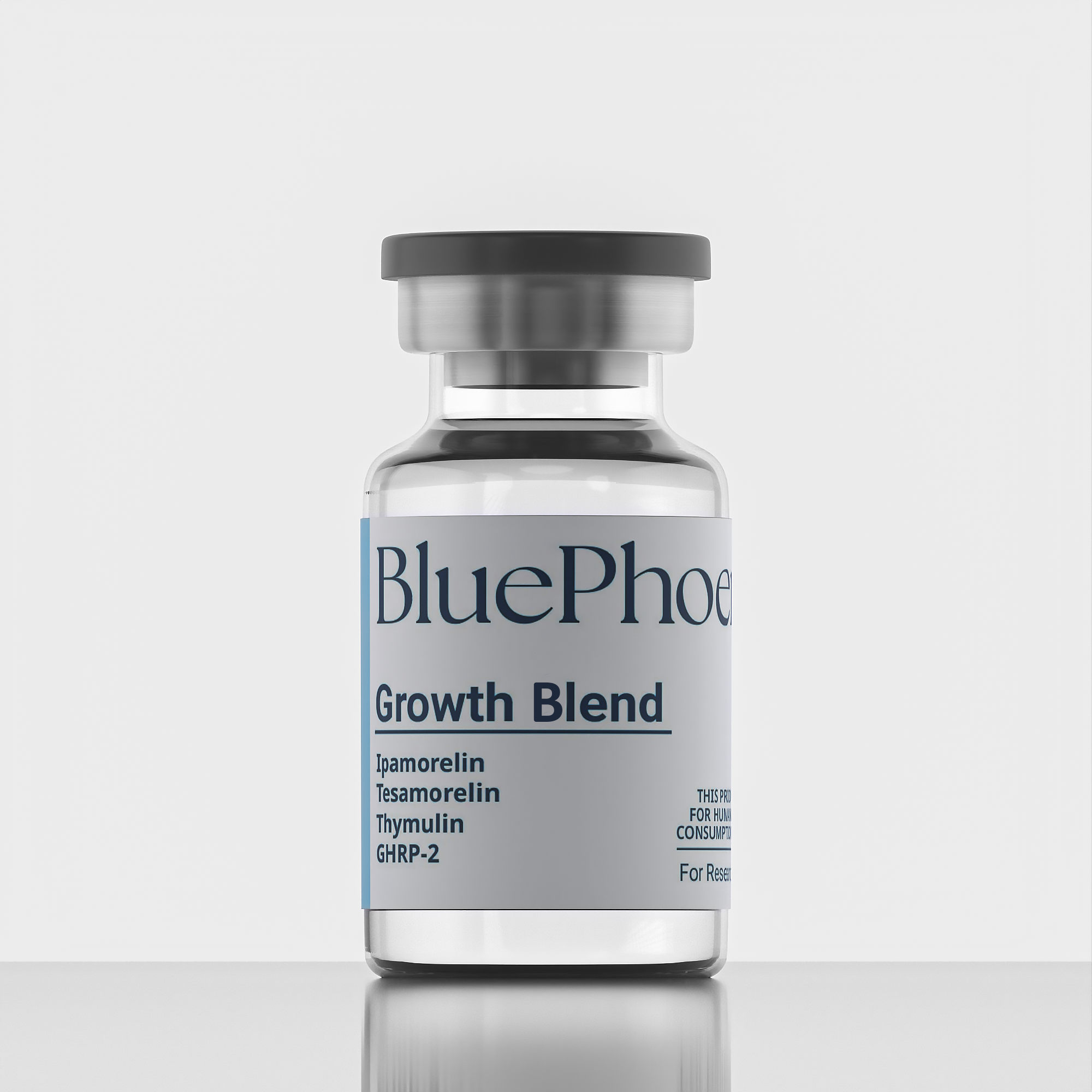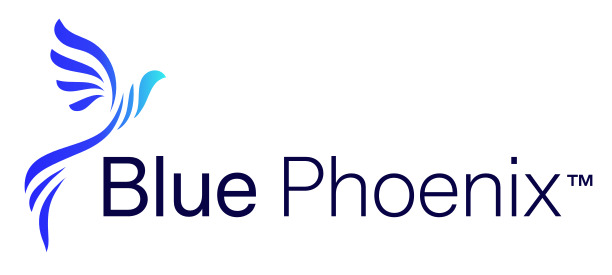
Growth Blend
FREE Shipping
for orders over $200

Muscle Growth and Fat Loss

Increase Energy and Performance

Enhanced Immunity and Recovery
Product Usage: This PRODUCT IS INTENDED AS A RESEARCH CHEMICAL ONLY. This designation allows the use of research chemicals strictly for in vitro testing and laboratory experimentation only. All product information available on this website is for educational purposes only. Bodily introduction of any kind into humans or animals is strictly forbidden by law. This product should only be handled by licensed, qualified professionals. This product is not a drug, food, or cosmetic and may not be misbranded, misused or mislabled as a drug, food or cosmetic.
Furthermore, studies indicate that tesamorelin may enhance memory and cognitive abilities in both healthy older adults and individuals with mild cognitive impairment who are at risk of progressing to Alzheimer’s disease.
Combining both Ipamorelin and Tesamorelin could potentially produce enhanced effects because each peptide activates the growth hormone axis through distinct mechanisms. Together, they work synergistically to stimulate the pituitary gland to naturally produce and release growth hormone at levels reminiscent of youth. Studies have shown that this combination leads to improved deep sleep, reduced levels of triglycerides, visceral adipose tissue (VAT), and carotid intima media thickness (cIMT), enhanced cognitive function, and overall better metabolic health.
Research in mice indicates that Ipamorelin and Tesamorelin have minimal side effects, along with excellent subcutaneous bioavailability when administered orally. However, dosages per kilogram in mice cannot be directly applied to humans. It’s important to note that Ipamorelin and Tesamorelin are available for purchase at Peptide Sciences exclusively for educational and scientific research purposes, not for human consumption. Only licensed researchers should acquire Ipamorelin and Tesamorelin.
Thymulin is a peptide with notable immunomodulatory properties, primarily acting as a regulator of the immune system’s function. It plays a crucial role in the maturation and differentiation of T-cells, key players in the body’s immune response. Thymulin’s function is particularly significant in maintaining the balance between different immune cell populations, contributing to overall immune health.
In terms of its mechanism of action, Thymulin binds to specific receptors in the body, particularly those found in the thymus gland, which is central to the development and regulation of T-cells. By interacting with these receptors, Thymulin helps orchestrate the production and function of T-cells, which are essential for mounting effective immune responses against pathogens and other foreign invaders.
Research suggests that Thymulin may have potential therapeutic applications beyond its role in immune regulation. Studies have explored its effects on various conditions, including autoimmune disorders, where dysregulation of the immune system plays a central role. Additionally, Thymulin’s ability to modulate inflammation and oxidative stress has attracted interest in its potential use in conditions associated with immune dysfunction and chronic inflammation.
GHRP-2, short for Growth Hormone Releasing Peptide-2, is a synthetic peptide known for its ability to stimulate the release of growth hormone from the pituitary gland. It belongs to a class of compounds called growth hormone secretagogues, which mimic the action of ghrelin, a natural hormone that stimulates appetite and growth hormone release.
One of the key features of GHRP-2 is its potency in triggering the secretion of growth hormone. It binds to specific receptors in the pituitary gland, known as ghrelin receptors, and stimulates the release of growth hormone in a pulsatile manner. This pulsatile release is similar to the natural pattern seen in the body, which is essential for regulating various physiological processes, including growth, metabolism, and tissue repair.
Unlike some other growth hormone secretagogues, GHRP-2 has been noted for its relatively mild effects on appetite stimulation. This makes it a preferred choice for individuals who wish to avoid excessive increases in appetite while still benefiting from the growth hormone-releasing properties of the peptide.
Research into the potential therapeutic applications of GHRP-2 has yielded promising results in various areas. Studies have investigated its use in promoting muscle growth, enhancing wound healing, and improving recovery from injuries or surgery. Additionally, GHRP-2 has shown potential in mitigating the effects of age-related decline in growth hormone levels, which may have implications for combating age-related conditions such as sarcopenia and frailty.
- Adrian, S., et al. (2019). The Growth Hormone Releasing Hormone Analogue, Tesamorelin, Decreases Muscle Fat and Increases Muscle Area in Adults with HIV. J Frailty Aging, 8(3):154-159. DOI: 10.14283/jfa.2018.45
- Clemmons, D. R., Miller, S., & Mamputu, J. (2017). Safety and Metabolic Effects of Tesamorelin, A Growth Hormone-releasing Factor Analogue, in Patients with Type 2 Diabetes: A Randomized, Placebo-controlled Trial. PLoS One, 12(6): e0179538. DOI: 10.1371/journal.pone.0179538
- Johansen PB, Nowak J, Skjaerbaek C, Flyvbjerg A, Andreassen TT, Wilken M, Orskov H. Ipamorelin, a new growth-hormone-releasing peptide, induces longitudinal bone growth in rats. Growth Horm IGF Res. 1999 Apr;9(2):106-13. doi: 10.1054/ghir.1999.9998. PMID: 10373343.
- Beck, David E., et al. “Prospective, Randomized, Controlled, Proof-of-Concept Study of the Ghrelin Mimetic Ipamorelin for the Management of Postoperative Ileus in Bowel Resection Patients.” International Journal of Colorectal Disease , vol. 29, no. 12, 21 Oct. 2014, pp. 1527–1534, 10.1007/s00384-014-2030-8.
- Michael Ankersen, Nils L. Johansen, Kjeld Madsen, Birgit S. Hansen, Kirsten Raun, Karin Kramer Nielsen, Henning Thøgersen, Thomas K. Hansen, Bernd Peschke, Jesper Lau, Behrend F. Lundt, and Peter H. Andersen. A New Series of Highly Potent Growth Hormone-Releasing Peptides Derived from Ipamorelin. Journal of Medicinal Chemistry 1998
- Raun, Kirsten & Hansen, B & Johansen, N & Thøgersen, Henning & Madsen, K & Ankersen, Michael & Hongaard Andersen, Peter. (1998). Ipamorelin, the first selective growth hormone secretagogue. European journal of endocrinology / European Federation of Endocrine Societies. 139. 552-61. 10.1530/eje.0.1390552.
- Fourman, L. T., et al. (2017). Visceral Fat Reduction with Tesamorelin is Associated with Improved Liver Enzymes in HIV. AIDS, 31(16):2253–2259. DOI: 10.1097/QAD.0000000000001614
ALL ARTICLES AND PRODUCT INFORMATION PROVIDED ON THIS WEBSITE ARE FOR INFORMATONAL AND EDUCATIONAL PURPOSES ONLY.
The products offered on this website are furnished for in-vitro studies only. In-vitro studies (Latin: in glass) are performed outside of the body. These products are not medicines or drugs and have not been approved by the FDA to prevent, treat or cure any medical condition, ailment or disease. Bodily introduction of any kind into humans or animals is strictly forbidden by law.


